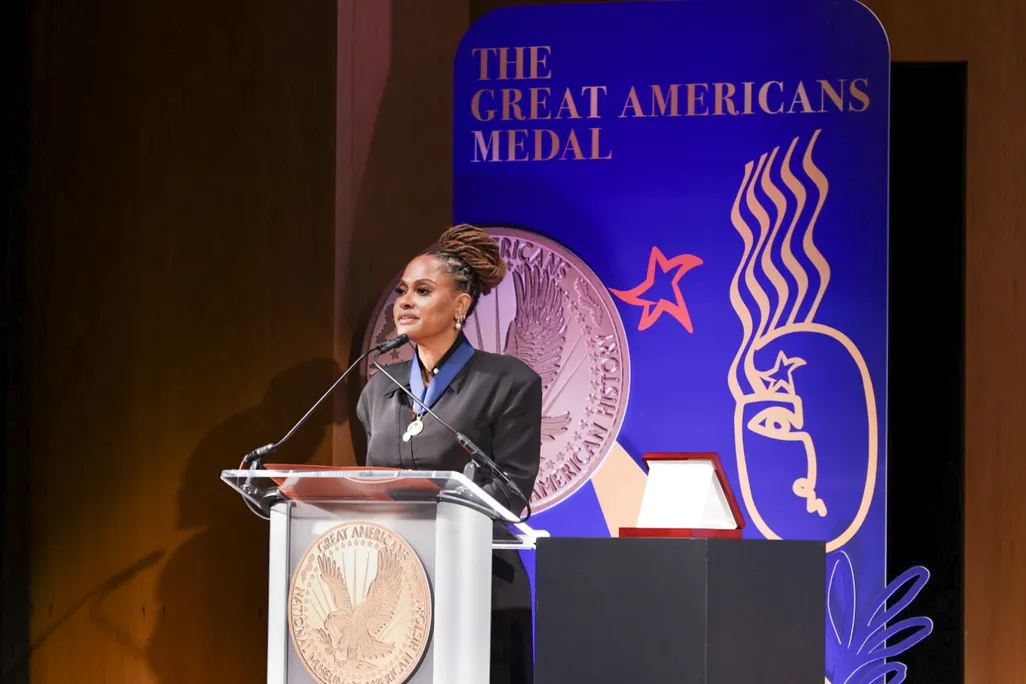WWW.SMITHSONIANMAG.COM
Trailblazing Filmmaker Ava DuVernay Receives the Smithsonian's Great Americans Medal
Women Who Shaped History
A Smithsonian magazine special report
Trailblazing Filmmaker Ava DuVernay Receives the Smithsonian’s Great Americans Medal
DuVernay is the first director, writer and producer to earn the honor, which recognizes “lifetime contributions embodying American ideas and ideals”
Ava DuVernay delivers her acceptance speech for the National Museum of American History’s Great Americans Medal.
Ronald Flores / National Museum of American History
The Smithsonian’s National Museum of American History (NMAH) presented trailblazing director, writer and producer Ava DuVernay with its Great Americans Medal on May 8 for “lifetime contributions embodying American ideas and ideals.”
Known for making art that looks “squarely at society and takes it to task,” as novelist Jesmyn Ward wrote for Smithsonian magazine in 2017, DuVernay is the tenth recipient of the medal. Previous winners include former Secretary of State Madeleine Albright, baseball star Cal Ripken Jr. and singer-songwriter Paul Simon.
“There was probably a safer, gentler choice of person,” DuVernay tells Smithsonian. Centering African-American stories and characters, DuVernay’s films frequently come into contact with the third rails of American history, such as incarceration, segregation and slavery.
Consider August 28: A Day in the Life of a People (2016), a short film DuVernay was commissioned to make for the Smithsonian’s National Museum of African American History and Culture. In just 22 minutes, DuVernay examines six major events in Black history that happened to fall on August 28: the 1833 Slavery Abolition Act in the United Kingdom; the lynching of Emmett Till in 1955; the release of Motown’s first number-one single, “Please Mr. Postman,” in 1961; Martin Luther King Jr.’s “I Have a Dream” speech in 1963; the landfall of Hurricane Katrina in 2005; and Barack Obama’s acceptance of the Democratic nomination for president in 2008.
Smithsonian's Great Americans Medal | Ava DuVernay, Tenth Recipient, May 8, 2025
Watch on
“I wanted to make sure that it wasn’t an orientation film but a film that inspired,” Smithsonian Secretary Lonnie G. Bunch III, who was the director of the museum at the time, recalled at Thursday’s ceremony. “I remain in awe of Ava’s ability to touch and unwrap the souls of a people.”
As a scholar of African-American history, Bunch admitted that he was initially skeptical of Selma (2014), DuVernay’s treatment of the 1965 civil rights marches across Alabama led by King. But at an advance screening of the film, he was blown away by DuVernay’s ability to turn a landmark historical event into a profoundly human story.
“She made a film that brought new understanding, new passion, new insights to a story that was so familiar to me,” Bunch said. “She made the familiar seem new, and that’s an amazing thing.”
In her films, DuVernay confronts history with nuance. Her work often sparks larger conversations about America’s darkest moments—and how those moments reverberate through the present day.
“It’s not lost on me what it means to be here in this place supported by an institution that understands the weight of history and the wonder of telling it well,” DuVernay said in her acceptance speech. “History is not a weapon to be sheathed when convenient. It’s not a bedtime story meant to lull us to sleep. It’s a river flowing deep and often turbulent. And the Smithsonian has long been the bridge that lets us cross with care.”
DuVernay’s films have garnered remarkable acclaim. Anthea M. Hartig, the director of NMAH, tells Smithsonian that by bringing difficult stories to the mainstream, DuVernay has “changed the architecture of the film canon.”
In 2012, she won the Sundance Film Festival’s Best Director award for her second feature film, Middle of Nowhere, which follows a woman separated from her incarcerated husband. Two years later, Selma became the first film directed by an African American woman to be nominated for a Best Picture Oscar. Her 2018 adaptation of A Wrinkle in Time made her the highest-grossing Black woman director in American box office history.
But the Great Americans Medal isn’t a film industry award. It recognizes DuVernay not just for her work on the screen, but for her broader contributions to American culture. Compared to traditional film awards, the medal “feels like wind under my sails. … It feels really different in a beautiful way,” she tells Smithsonian.
The award also recognizes the character of its recipients—and how they embody America’s highest ideals. “I grew up in an immigrant neighborhood, and in the immigrant neighborhood the highest claim you could say about somebody was that they were good people,” Bunch explained. “Good people was described as someone who was unselfish, whose life and work made a community, a people, a nation better. Ava is good people.”
DuVernay also credited the “good people” she’s encountered throughout her career. “The beautiful thing about influence is that it’s an echo,” she tells Smithsonian. “I’ve been influenced by people I’ve been in conversation with on the supermarket line. It’s really about allowing yourself to stay open.”
For a filmmaker drawn to history, DuVernay has never lost sight of the present—or the future.
“The future belongs to the whole of us,” DuVernay said at the end of her speech. “Even when the current swell is upon us, the bridge will hold because truth deserves passage. And with the Smithsonian and this museum, we do not cross alone.”
Get the latest stories in your inbox every weekday.
